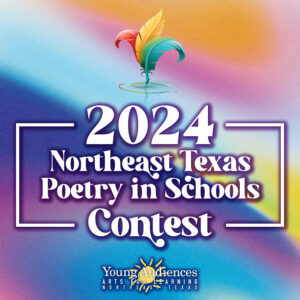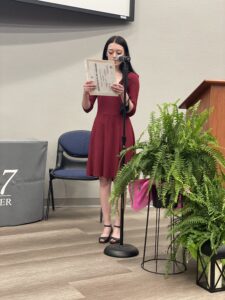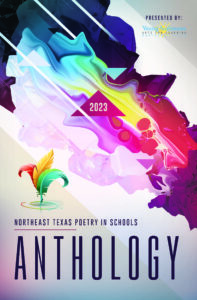
2025 Winner’s Ceremony will be held at Region 7 ESC in Kilgore, TX on Friday, April 25th!

2024 12th grade, 1st Place Winner
Sydney Dwyer, Hudson High School

Each year the 12th grade winner receives a $500 scholarship from The Rusk County Poetry Society.
Submissions for the 2024 Northeast Texas Poetry in Schools Contest were accepted February 1, 2024 through March 1, 2024. A panel of judges consisting of local writers and artists will select three winning poems from each grade level. Each year the winning students read their work aloud to an audience of teachers, peers, friends and family at an awards ceremony at Region 7 ESC in Kilgore. Winning poems will be published in the annual Northeast Texas Poetry in Schools Anthology and each winning poet will receive a certificate of accomplishment.
The Northeast Texas Poetry in Schools contest began nearly 50 years ago, by the Rusk County Poetry Society in Henderson. In order to broaden the reach of the contest, Young Audiences of Northeast Texas took over the project in 2012. In 2015, the contest welcomed Region 7 Education Service Center as a community partner. Each year Young Audiences accepts nearly 1000 entries from students across Northeast Texas. The contest is open to any 1st-12th grade public, private or home-schooled student in the area. The contest aims to provide students with the opportunity to express themselves through writing, but also to learn about the art form of poetry and using language to its fullest potential.
Click HERE to view the 2023 Northeast Texas Poetry in Schools Anthology and view pictures from the awards ceremony.
2023 12th grade, 1st Place Winner
Da’Marion VanZandt, Kilgore High School

Each year the 12th grade winner receives a $500 scholarship from The Rusk County Poetry Society.
Submissions for the 2023 Northeast Texas Poetry in Schools Contest were accepted February 1, 2023 through March 1, 2023. A panel of judges consisting of local writers and artists will select three winning poems from each grade level. Each year the winning students read their work aloud to an audience of teachers, peers, friends and family at an awards ceremony at Region 7 ESC in Kilgore. Winning poems will be published in the annual Northeast Texas Poetry in Schools Anthology and each winning poet will receive a certificate of accomplishment.
Frequently Asked Questions
Frequently Asked Questions
Who do I contact with questions?
Our Program Director, Tasha Prescott, tasha@yanetexas.org
Can I submit my poems by mail
No. While we have accepted poems this way in the past, we switched to an all-online submission process in 2015.
Can my students submit their own poems?
No. While we appreciate every student’s excitement for poetry, we ask that poems be submitted only by teachers and homeschool parents.
Can I submit multiple grade levels in one entry?
Yes, however, each grade level must have their own document uploaded.
Can I submit more than one poem per student?
No. While we are so glad to see students writing a lot of poetry, especially on their own, we only allow one poem per student to be submitted each year.
Should I put my students’ names on their poems?
Yes! Each student’s name, grade level, teacher name, and school name must be on each poem.
Is there a theme for the contest?
No! Students may write on whatever topics or themes they would like.
.
Submission Guidelines & Eligibility
Submission Guidelines:
- All poems must be submitted online through the Google Form
- All poems per grade level should be submitted in ONE google document
- Table of Contents (List all student names, first and last, along with poem title in the order in which they appear in the document)
- Teacher name, school name, grade level in the “header” section
- Each page should be numbered and only one poem per page
- Students full name should be at the top of their poem page along with poem title
- Poems may not exceed 28 lines
- Poems should be typed without illustrations
- Only one entry per student
- Entries must be original, unpublished, typed poems written by the student
- Poems must be submitted by teachers or homeschool parents only
- Poem documents should be titled/saved as: SchoolName.TeacherLastName.GradeLevel (example: YoungAudiences.Prescott.Seventh)
Eligibility
Students in grades 1-12 from any public, private, charter, or home school that lies within the Northeast Texas Region are eligible to submit poems to the contest.
Notification of Winners
-
Teachers must reply by email to confirm the announcement of their winning students has been received.
-
All winning students’ poems must have a parent consent form submitted before their awards can be finalized. Failure to do so will result in the poem’s disqualification. More information on the permission form will be given to teachers/parents of winning students.
Suggestions for Teachers and Parents
Suggestions for Teachers and Parents
- Poetry is a conversation between the mind and the heart. Help your students feel comfortable explore interesting intellectual questions with a heart that is open to deep feelings and free to play!
- Prize-winning poems are marked by originality and imagination; they celebrate the power of language! Avoid asking your whole class to write similar poems or giving prescribed subjects or forms to use. It is very difficult to choose a winner from dozens of almost identical poems.
- Prize-winning poems feature language, subjects and thoughts that are mature for the grade level. Especially encourage secondary level students not to submit simplistic love and nature poems.
- Prize-winning poems are extraordinary. Encourage your students to “color outside the lines” with phrasing and word choices that are surprising and yet clear in meaning and well-understood.
- Prize-winning poetry speaks best with “what is between the words.” Have your students examine their poems for implied meaning and connotation. Secondary students, especially, should be able to identify the underlying theme of their poems, explain metaphors and express personal insights.
- Prize-winning poetry is more than fact or anecdote or narrative or even emotion. Encourage students to use imagery and metaphor, simile and sound, rhythm and repetition to make “word art.”
- Expose students to a broad range of poetry before writing. Share your favorite classic poems with your students, as well as works by less famous and contemporary poets. They should see that, while traditional poetry can be impressive, not all poems rhyme, follow a set form or feature “pretty” words.
- Encourage students to write about experiences that evoke conicted feelings: fears, dreams, joys, passions, regrets, memories, worries. Remind them that prize-winning poetry compels deep thinking.
- When choosing subjects to write about, especially for competitions, realize which topics will be overdone and help students choose an unusual subject or viewpoint they have experienced.
- Have your students type their work, then help them check it. Neatness, good grammar and proper spelling make it easier to judge a poem on its merits! Still, it should be their own writing!
Need Assistance? Contact Tasha Prescott at tasha@yanetexas.org


